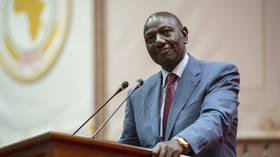Climate groups reject African environmental initiative

Climate activists have criticized the recently launched Africa Carbon Markets Initiative (ACMI), arguing that it is incapable of delivering on its stated goals for the continent and will instead undermine efforts to reduce emissions of greenhouse gases at source.
In a report made public on Tuesday, the climate-focused organization Power Shift Africa and partners likened the ACMI to a “wolf in sheep’s clothing” that will create “numerous new and serious problems while not providing any real benefits.”
The ACMI was launched last year in Egypt at the 27th United Nations Climate Change Conference, commonly known as COP27, to boost Africa’s carbon credit production to 300 million credits annually by 2030 and to create jobs on the continent.
The initiative is said to have attracted pledges worth hundreds of millions of dollars this week at the first African Climate Summit, held in Kenya. The United Arab Emirates (UAE) Carbon Alliance pledged to purchase $450 million in carbon credits from the ACMI by 2030.
African governments, including Kenya, Malawi, Gabon, Nigeria, and Togo, see carbon credits and similar market-driven financial instruments as critical to unlocking billions for their economies’ climate finance needs while expanding energy access.
However, Power Shift Africa’s report claims that “failures” in carbon markets make the ACMI a “threat” rather than an “opportunity” for African nations. It says polluting companies in rich-world countries buy dodgy pollution permits instead of cutting their emissions.
“Carbon markets benefit the polluters, the fossil fuel companies and the market brokers. It will drive pollution beyond climate limits and put neo-colonial obstructions to the attainment of genuine African development pathways,” the authors warn.
Maimoni Mariere Ubrei-Joe, Coordinator of the Climate Justice and Energy Program at Friends of the Earth Africa, one of the report’s authors, believes that the carbon-market initiative will not cut emissions at source.
“We must reject any initiative that has no focus on attaining 100% renewable energy in the African continent,” Ubrei-Joe added.
Last month, over 400 civil society organizations petitioned Kenyan President William Ruto, expressing “grave” concern about being excluded from this week’s African Climate Summit in the capital, Nairobi.
The group claimed Western governments and organizations had hijacked the summit, including the American firm McKinsey, and were “hell-bent” on pushing a pro-West agenda and interests at the expense of Africa.













